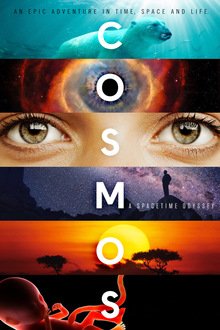- Rating: 9.30
- Year of issue: 2014
- Genres: Animation, Documentary
- Countries: United States
- Duration: 557 minutes
A documentary series that explores how we discovered the laws of nature and found our coordinates in space and time.
1. Standing Up in the Milky Way
DescriptionMore than three decades after the debut of Carl Sagan's groundbreaking and iconic series, “Cosmos: A Personal Voyage,” it's time once again to set sail for the stars. Host and astrophysicist Neil deGrasse Tyson sets off on the Ship of the Imagination to discover earth's Cosmic Address and its coordinates in space and time. Viewers meet Renaissance Italy's Giordano Bruno, who had a spiritual epiphany about the infinite expanse of the universe. Then, Tyson walks across the Cosmic Calendar, on which all of time has been compressed into a year-at-a-glance calendar, from …2. Some of the Things That Molecules Do
DescriptionHost Neil deGrasse Tyson is on a voyage to explore the relatedness of all livings things and the possible evolution of life in the cosmos. Go on a journey to discover how artificial selection turned the wolf into canine breeds and how natural selection sculpted the complex human eye. Later, Tyson visits the grand Hall of Extinction, a monument to all the broken branches on the tree of life. Retrace the story of life on Earth and the unbroken thread that stretches from the first one-celled organisms to human life.3. When Knowledge Conquered Fear
DescriptionNeil deGrasse Tyson sets off on the Ship of the Imagination to chase a single comet through its million-year plunge toward the sun. Later, Tyson visits the birthplace of Sir Isaac Newton and retraces the unlikely friendship between Newton and brilliant polymath Edmond Halley. It was Halley's patience and generosity which allowed Newton to conquer his fear of isolation and find the courage to publish his masterwork, “Principia Mathematica” which launched a science revolution.4. A Sky Full of Ghosts
DescriptionExplores how light, time and gravity affects our perception of the universe5. Hiding in the Light
DescriptionThe Ship of the Imagination travels back in time to reveal 11th century Europe and North Africa during the golden age of Islam, when brilliant physicist Ibn al-Haytham discovered the scientific method and first understood how we see, and how light travels. Later, William Herschel discovers the infrared and the signature hidden in the light of every star, eventually unlocking one of the keys to the cosmos.6. Deeper, Deeper, Deeper Still
DescriptionThe Ship of the Imagination ventures on an epic voyage to the bottom of a dewdrop to explore the universe on the smallest scale and observe exotic life forms invisible to the naked eye. Then, host Neil deGrasse Tyson explains the neural network in our brains which determine our sense of smell and memory, and later, he travels deep beneath the surface of the Earth to discover the most mysterious particle we know.Host: Neil deGrasse Tyson7. The Clean Room
DescriptionTo determine the true age of the Earth, geochemist Clair Patterson developed the uranium-lead dating method to make an unprecedented discovery - calculating Earth's age of 4.5 billion years. But Patterson's groundbreaking discoveries were just beginning. Patterson made it his mission to draw public attention to the detrimental effects of lead in the environment and dedicated his career to fighting against the petroleum and chemical industry, eventually achieving public health's biggest victory of the 20th century.8. Sisters of the Sun
DescriptionExplores the violent cosmic phenomenon of supernovas, which on average occur once per galaxy per century or one billion times per year in the observable universe.9. The Lost Worlds of Planet Earth
DescriptionThe Ship of the Imagination embarks on a journey through space and time to grasp how the autobiography of the Earth is written in its atoms, its oceans, its continents and all living things. Later, American geologist Marie Tharp creates the first true map of Earth's ocean floor, and discovers microscopic life that exists deep beneath the ocean.10. The Electric Boy
DescriptionTravel to 19th century England and meet Michael Faraday, a child of poverty who grew up to invent the motor and the generator. His ideas about electricity and discovery of magnetic fields changed the world and paved the way for future scientists to make giant strides in the world of high technology and instantaneous communication.11. The Immortals
DescriptionThe Ship of the Imagination travels across the cosmos to discover the possibility of beings that live forever and explain why other civilizations perish. Then, visit the Cosmic Calendar of the Future and contemplate what lies ahead with a hopeful vision.12. The World Set Free
DescriptionDegrasse discusses our nearest neighboring planet Venus and its climate, the climate change on Earth and if it is caused by humans.13. Unafraid of the Dark
DescriptionDescription of the two Voyager probes sent for interstellar travel. Tyson ends the series by emphasizing Sagan's message on the human condition in the vastness of the cosmos & to encourage viewers to continue to explore and discover the undiscovered.
